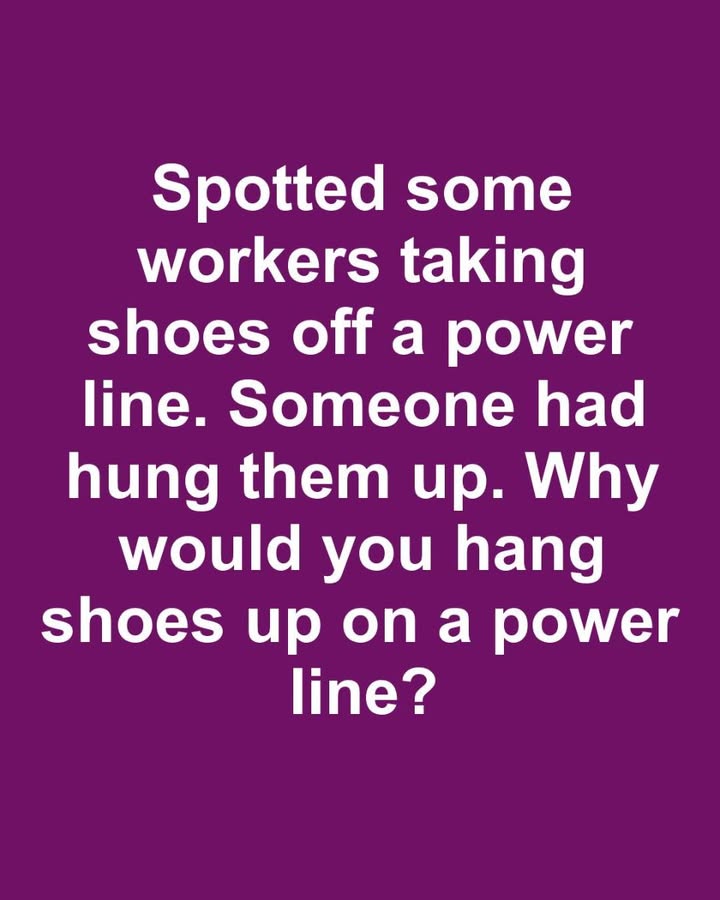Several theories attempt to explain why people hang shoes on power lines. Some suggest it’s a prank or a rite of passage for teenagers celebrating a pivotal moment like graduating or the end of a school year.
Others speculate that it might serve as a territorial marker for gang activity—though evidence supporting this is primarily anecdotal. Some theories even claim its intent is to signal a nearby drug house, yet these claims lack substantial proof.
Urban Legends and Myths Associated with the Practice
An array of urban legends has arisen around why shoes are thrown over power lines. One common myth is that the hanging shoes are a notification of a nearby drug dealer’s presence, serving as a clandestine signal in urban neighborhoods.
Another legend suggests that the shoes belong to someone who has died, hanging them represents paying tribute or disrespect. These legends vary widely across regions and contribute to the mystique of the practice.
Safety Concerns and Risks of Hanging Shoes on Power Lines
Though seemingly innocuous, hanging shoes on power lines poses significant safety risks. The additional weight can damage power lines, disrupting electricity service and potentially causing power outages.
More importantly, this act can pose a hazard during the shoe retrieval process, exposing workers to dangerous conditions and heightening the risk of electrical accidents. Public safety officials often discourage this practice due to these associated dangers.
Case Studies: Incidents of Shoe Removal from Power Lines
In certain locales, city workers have been tasked with removing shoes to ensure public safety and prevent disruption. For instance, residents of a neighborhood in Los Angeles reported frequent power cuts due to shoe-laden lines, necessitating municipal intervention to clear the obstructions.
Documented cases generally illustrate a spectrum of circumstances from deliberate acts of vandalism to simple mischief, and the responses have been crucial in understanding community dynamics.
Community Responses and Reactions
Community reactions to shoes on power lines vary widely. While some view it as a harmless prank indicative of youthful rebellion, others see it as a troubling omen or an eyesore affecting neighborhood aesthetics.
Local advocacy groups sometimes rally for removal and cleanup, emphasizing the need for maintaining a safe and visually appealing environment. In contrast, others might see the shoes as a quirky artistic expression, arguing against their removal.
Legal Implications and Authorities’ Perspectives
Legally, local authorities often view hanging items on power lines as vandalism or destruction of public property, leading to fines or other penalties for offenders. Law enforcement and utility companies frequently work together to prevent such occurrences, emphasizing the importance of public safety and infrastructure integrity. Authorities usually take a preventative stance, aiming to educate communities about the dangers and legal consequences involved.
Efforts to Prevent and Address the Practice
Many cities and townships have adopted educational campaigns and community outreach programs to address the issue of hanging shoes. Utility companies often collaborate with schools and community groups to inform residents about the potential hazards and the significance of preserving public utilities. Removal initiatives are also routinely carried out, wherein community members are encouraged to report such incidents for timely intervention.
Conclusion: Understanding the Reasons Behind the Peculiar Custom
Despite the variety of reasons speculated behind the practice of hanging shoes on power lines, it remains a complex social phenomenon deeply embedded in cultural and symbolic meanings. It reflects aspects of human behavior such as expression, communication, and sometimes defiance. Understanding these diverse motivations highlights the intersection of tradition, culture, and urban mythology, providing insights into modern societal practices and challenges.

